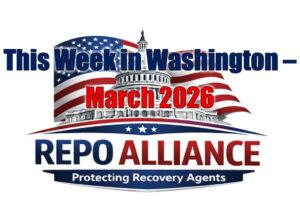Subprime meltdowns, bankruptcy basics and lessons to learn.
After last week’s bankruptcy filing by subprime dealership and lender Tricolor, I hadn’t yet received the full list of the 26,000+ effected creditors. Well, I finally did get them last Friday. On that list were many names we all know well. For the repossession industry, it was worse than I had expected.
Some Numbers
Tricolor’s creditor list in the chapter 7 bankruptcy plan was 438 pages long and too big for me to share online. Searching through them with the following key words to the vendor list of unsecured creditors I found the names of a lot of agency owners I know. In addition, I found:
- 247 companies with the word “Recovery” in them.
- 18 with the word “Adjuster”
- 8 with the word “Collateral”
- 264 with the word “Tow”
Conservatively, I would estimate the actual number of repossession companies and service providers is well over 300. In an industry the Bureau of Labor Statistics (BLS) lists as having about 850 agencies, this is a lot. Although the actual numbers are closer to 1,700, it is still a significant impact on the industry.
As bad as that is, there were 702 with the word “Transport”. In addition, Adesa auctions were listed 37 times. A lot of people are losing a lot of money. Millions!
There were no forwarders on the list. From much of what I’ve heard, a pretty good number of agencies worked direct with Tricolor and had recently been experiencing slow pays and no pays from them.
The bad news: everybody is listed as unsecured except JPMorgan Chase & Co., Fifth Third Bancorp. In short, that means that no one is getting paid. That could very well equate to millions in lost revenue to the industry.
All of those cars in inventory are assets of the debtor (Tricolor) and are collateral for the secured loans, JPMorgan Chase & Co., Fifth Third Bancorp. The trustee will eventually demand possession of them for liquidation.
Notice I say “eventually”. As if having none of repossession fees they owe the agencies discharged wasn’t damage enough, the trustee and bankruptcy court are extremely unlikely to pay any storage fees for the weeks and probable months they are stored.
Rumors of Fraud
Ever since the rumbling of a potential bankruptcy, there have been rumors of ongoing investigations into Tricolor’s operations.
A recent Bloomberg report indicated that JPMorgan Chase & Co., Fifth Third Bancorp, and Barclays Plc could be preparing for combined losses in the hundreds of millions from loans issued to Tricolor, according to a Tuesday regulatory filing by Fifth Third.
- The bank disclosed an impairment charge of about $200 million after uncovering alleged fraudulent activity at a commercial borrower, which was not identified.
- Lenders are reportedly investigating whether collateral for warehouse lines was double pledged, according to unnamed sources.
- Fifth Third, which learned of the situation last week with a borrower using its warehouse facilities, is working with law enforcement on the matter.
According to Bloomberg, JPMorgan, Barclays, and Fifth Third have all served as warehouse lenders to Tricolor, which suspended its auto operations earlier this month.
Fifth Third Chief Executive Officer Tim Spence, stated to Bloomberg“…Based on our ongoing review, it appears there is significant fraud in the collateral filed that was used to support the borrowing base in all their warehouse facilities, as well as the audited financial statements of the company,”.
It’s a mess, no question about it. And while big faceless lenders are left holding the biggest of the debts, it doesn’t soften the blow for the average agency caught up in it.
Trickle Down
The ramifications of this at the agency will vary but it is clear that many agencies have been effected. Some agencies are well reserved enough to absorb these losses with no serious interruption to operations this time. So, what happens if this becomes a bigger issue?
Let’s suppose a hypothetical lender falls on the same sword but, unlike Tricolor, who is a mere 1-2% of the ABS market, they are ten times bigger. You could expect the following:
- A cessation of all operations – All assignments go on hold. Redemptions could also be put on hold causing massive borrower impact.
- Repo bills to agents go unpaid – Obviously the lender would quit paying. Bad enough if you’re getting direct loan assignments. Worse for the forwarders.
- Forwarders go unpaid – Now, take the impact of direct assignments on the agencies and magnify that by 1,000. If the forwarders aren’t getting paid, they will definitely have trouble paying their agent network for all work performed, subprime or not. Even well capitalized forwarders may have to reach out for additional liquidity and take cost-cutting measures internally, such as downsizing.
- Bankruptcies – If a forwarder is unable to secure loans for additional capital, met with the demand for payment from repossession agencies and others, they may have to pull the plug and file bankruptcy as well.
All this of course trickles down into the repossession services sector. If the lenders aren’t paying the forwarders, the forwarders will have trouble paying the agents. And if the agents aren’t getting paid and are not well reserved, they too may end up pulling the plug.
Fortunately, it hasn’t gotten that bad yet.
Some Bankruptcy Basics
In light of the bankruptcy filing of Tricolor, many questions have been raised about debtor responsibility to creditors. By creditors, that means agents, forwarders and anyone they owe money to. Unless their debts were implicitly designated as security to the extended credit, they are considered unsecured.
In a chapter 7 bankruptcy filing, all unsecured debts are discharged. All secured debts are subject to the three “R’s” as I’ve always referred to them: They are either Redeemed (paid in full or fair market value), Repossessed (surrendered for liquidation to the secured creditor) or Reaffirmed (held aside from the bankruptcy proceedings by court allowance and maintained as originally written.)
Up front, I am not a lawyer and am not giving legal advice. I am only speaking from 25 years’ experience in dealing with the bankruptcy process as a VP of collections and lending.
If your company is one of the hundreds of agencies listed in this bankruptcy, I strongly suggest you seek legal council to understand your rights and the process.
Lessons to Learn
What goes up, must come down. While subprime lending soars for lengthy periods of time, the pressure to keep up the volume can often lead to poor business decisions and softening or shady underwriting. The history of subprime lending in asset backed securities (ABS) is a long one and one which I have just published to the CUCollector.com site as it does have indirect implications for the credit union industry.
The extension of credit is an exercise in judgement, and the risk should always be taken into careful consideration. Setting the most prudent price and rate are critical, this is how lenders compensate for risk.
Every time a repossession agency or forwarder accepts a repossession assignment from a lender without being paid up front, they are granting an extension of commercial credit. All lenders conduct some level of underwriting and due diligence before granting an extension of credit. I know with near complete certainty that agents don’t. Many businesses don’t.
Everyone takes a big leap of faith when it comes to accepting assignments and when those come from large lenders, a lot of reasonable caution gets thrown out the window.
This was not always the case. In the old days, many agencies required a retainer for services from used car lost or out-of-town lenders. But that was a long time ago and much has changed.
Now, hundreds of agencies are left holding worthless repo bills in the thousands and sometimes tens of thousands. Hundreds of agents will be further burdened with storing their collateral that they will not be compensated with storing.
So, should all agencies conduct strict financial vetting as part of the new client onboarding? That’s a judgement call.
How many of you believe that you could have seen anything in Tricolor’s financials that would have dissuaded you from doing business with them? Few, if any, and I think you all know that. They’re only going to show you want they want you to see.
Could you or should you price your services at a higher rate or require a retainer for subprime lenders? Go for it, but you’ll never get them to go for it. Someone else will always be willing to do it cheaper. Do I have an answer, nope!
The best I can suggest is that everyone maintains twelve months of reserve to help you weather any possible financial storms like were encountered during the pandemic. Easier said than done while working for $350 a car, I know, but there probably is no other option to guard against it.
Unfortunately, folks, this is the price of doing business. It stinks, but lenders go through it every day. Again, I urge any of you affected by this to seek legal counsel to understand your rights and the process.
Be safe,
Kevin Armstrong
Publisher











More Stories
Colorado Bill Aims to Severely Impact All Repossession Operations
Today is Fallen Agents Day – 2026
From Auction Cutting to Field Programming: The Structural Shift No One Budgeted For
Bad Apples in the Repossession Industry
Why Self-Help Repossession Is Taken for Granted — and Why Losing It Would Hurt Consumers Most
A Necessary Distinction: Financial Oversight vs. Financial Control